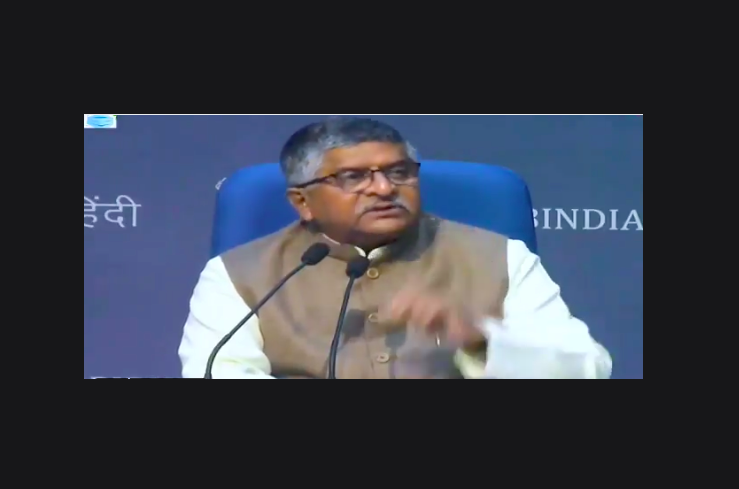New Delhi, NFAPost: The Union Cabinet on Wednesday approved the production-linked Incentive scheme for IT Hardware so that India will have a clear roadmap to further boost its manufacturing.
The scheme proposes an incentive to boost domestic manufacturing and attract large investments in the value chain of IT Hardware. The target segment under the proposed scheme includes laptops, tablets, all-in-one PCs, and servers said Union Minister Ravi Shankar Prasad.
This comes after the grand success of the Production Linked Incentive (PLI) scheme in bringing investments in the mobile phone (handsets and components) manufacturing.
According to a PIB press release, the Union Cabinet headed by Prime Minister Narendra Modi approved the PLI scheme for IT hardware products.
The target IT hardware segments under the proposed Scheme include Laptops, Tablets, All-in-One Personal Computers (PCs) and Servers. The scheme proposes a production linked incentive to boost domestic manufacturing and attract large investments in the value chain of these IT Hardware products.
IT hardware
The total cost of the PLI scheme for IT hardware is approximately Rs 7,350 crore over 4 years. The scheme intends to provide incentives between 4% to 1% on net incremental sales (over base year i.e. 2019-20) of goods manufactured in India and covered under the target segment, to eligible companies, for a period of four years.
As per the Cabinet statement, the scheme is expected to lead production worth Rs 3.26 lakh crore and exports worth Rs 2.45 lakh crore in four years. It is expected to bring additional investments of Rs 2,700 crore, earn direct and indirect revenue around Rs 15,760 crore and create 1.80 lakh jobs in four years.
The Cabinet statement says the PLI scheme for mobile phones and specified electronic components was launched last year during the middle of pandemic to establish India as a hub of electronic manufacturing.
Commenting on the new scheme, Union Telecom Minister Ravishankar Prasad said it has been a huge success in terms of interest received from global as well as domestic mobile manufacturing companies.
“16 companies were approved under the first round of the PLI scheme for large scale manufacturing of mobile phones and specified electronic components,” said Ravishankar Prasad.
Electronic ecosystem
The scheme was announced in April 2020; the last date for application was July 31, 2020, and the scheme commenced on August 1, 2020. All this happened during the most challenging times of Covid-19, when the economy and manufacturing was under severe stress.
The scheme will enhance the development of the electronics ecosystem in the country. India will be well-positioned as a global hub for Electronics System Design and Manufacturing (ESDM) on account of integration with global value chains, thereby becoming a destination for IT Hardware exports.
Ravishankar Prasad further said that the Production-Linked Incentive Scheme for mobile phones and components which was announced in April during the height of Covid-19 delivered production worth Rs 35,000 crore, created 22,500 jobs, and brought around Rs 1,300 investment.
Another scheme for promoting the manufacturing of electronics components called SPECS has also received 22 applications. A good atmosphere created by the Union Budget was being questioned as to how these Budget announcements will be achieved. The success of PLI shows how these announcements have been implemented, it added.
“The proposed scheme is likely to benefit major global as well as domestic manufacturers of IT hardware products namely Laptops, Tablets, All-in-One PCs, and Servers. This is an important segment to promote manufacturing as there is huge import reliance for these items at present,” the Cabinet said.
Investment in ESDM
PLI Scheme has conceived in a manner that incentives are payable by the government only after the investment has been done, employment has been generated, production and sales targets have been met.
According to The vision of National Policy on Electronics 2019 notified on 25.02.2019 is to position India as a global hub for Electronics System Design and Manufacturing (ESDM) by encouraging and driving capabilities in the country for developing core components, including chipsets, and creating an enabling environment for the industry to compete globally.
Currently, the laptop and tablet demand in India is largely met through imports valued at USD 4.21 billion and USD 0.41 billion respectively in 2019-20. The market for IT Hardware is dominated by 6-7 companies globally which account for about 70% of the world’s market share. These companies are able to exploit large economies of scale to compete in global markets. It is imperative that these companies expand their operations in India and make it a major destination for the manufacturing of IT Hardware.
Given the current global scenario, the world of manufacturing is undergoing a paradigm shift. Manufacturing companies across the globe are looking to diversify their manufacturing locations to mitigate the risk involved in depending on a single market.





